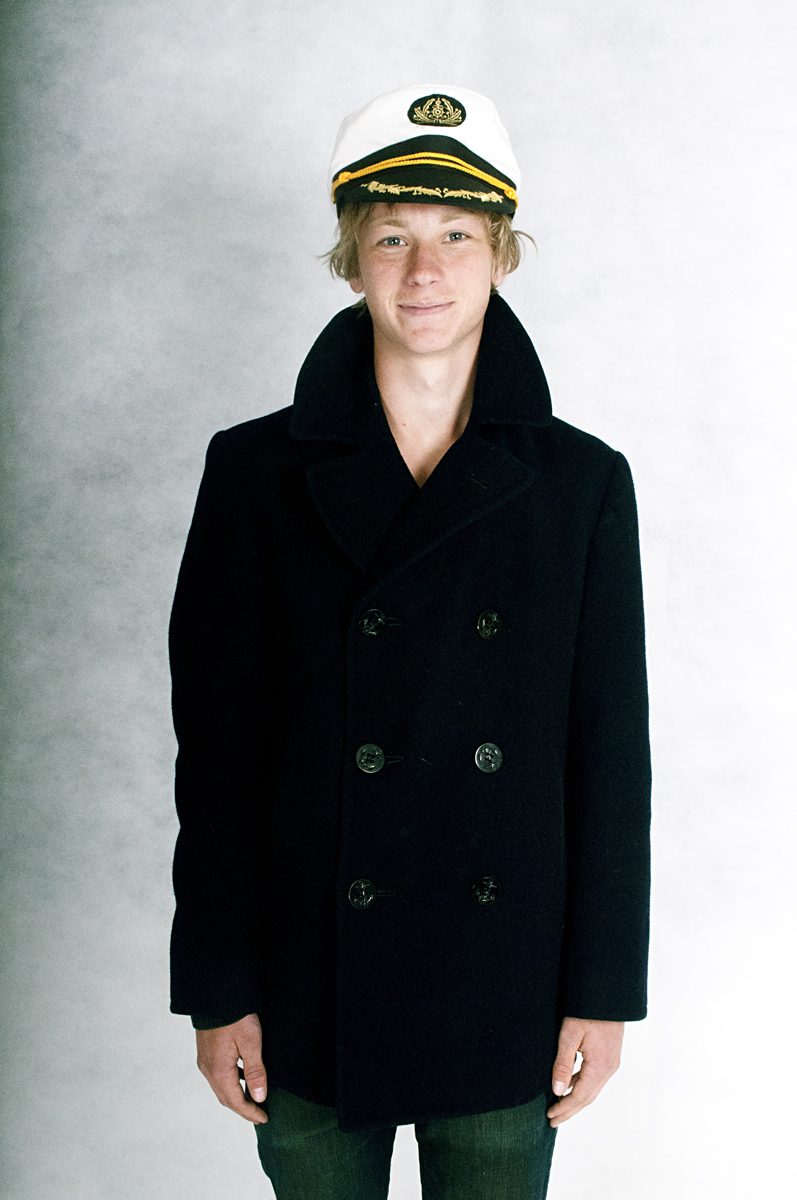Story by Natalie Horner
Photos by Jordan Brandt
He’s been in forty-five feature films and worked among the likes of Martin Scorsese, Tom Cruise, Robert De Niro, and Sandra Bullock, but chances are you wouldn’t recognize his name or face. Lary Crews is a professional extra or background actor. Thousands of people perform in his line of work every day and most will never be professionally acknowledged. Lurking opposite Jersey Shore and just left of celebrity, the background acting industry occupies the subculture of the entertainment industry—an industry built on exposure and consumption—and even though it’s always in the picture, it’s hardly noticed.
“If background actors are furniture, as one director said, I was determined to be the best piece of furniture I could be,” Crews says. “That’s why I created characters to play even though no one else knew.”
During his twenty-five-year stint as a radio broadcaster in Tampa Bay, Florida, Crews booked a few gigs as an extra, but he always wanted to be more involved with movies. In 2008, he moved to Burbank, California, started an acting blog and signed up to work with Central Casting.
Central Casting has been a resource for both movie producers and background actors for more than eighty years. Early films date back to the 1890s, but they were a far cry from the Hollywood blockbusters seen today. These films didn’t have official actors and were often unedited takes of everyday life. Within a span of thirty years, by 1922, there were about 30,000 background actors in Los Angeles looking for work. These acting hopefuls were willing and eager to do whatever it took to break into the Golden Age of Hollywood. And as a result, they were often exploited by reigning studios, forced to work long hours in poor conditions for little compensation.
In the years after Hollywood was flooded by background actors, stories of misconduct and scandal started making headlines in papers and magazines across the nation, threatening Hollywood’s elite status. In response, the major producers of the time, which included representatives from 20th Century Fox, Paramount Pictures, Warner Bros., and MGM, banded together to establish the Central Casting Corporation in 1925. Central Casting imparted regulations in the industry and put a halt to the exploitation, but many background actors today still struggle with the stigma attached to being a background actor.
“There are absolutely stigmas involved with being an extra,” says Amanda Cooper, an aspiring actress, who requested her name be changed because she doesn’t want to be associated with her work as a background actor.
“There are extras who are extras for life–that’s what they actually want to do and that’s great. Then there are extras who think they’re going to be discovered and become famous by doing extra work, which is never ever going to happen,” Cooper says. “Top agencies will not sign you if you’ve done extra work; they say it shows them that you’re not able to focus on your career or acting.”
Cooper, a theater arts graduate from the University of Oregon, moved to Studio City, California, in 2009. She was looking to break into the acting industry, but the twenty-four-year-old says she quickly learned that being an extra was not the best way to do that.
“That’s definitely the thing I think a lot of people don’t realize because a lot of people glorify being an extra,” Cooper says. “But it’s going to hold you back. In a way it makes sense; when you’re doing extra work, you’re working twelve- to sixteen-hour days and don’t have time to work on your career. It’s kind of upsetting to hear because now I have to ignore the fact that I did extra work.”
Crews, in turn, disagrees, and believes Cooper is taking unnecessary precautions.
“Firstly, casting agencies, elite or not, don’t go trolling around the Internet or publications looking for talent,” Crews says. “Secondly, you break into principal roles by being on set, and the best way to do that is to be a background actor.”
Damon Jones, founder and owner of Portland-based talent agency Actors in Action, says background work is a great experience for newcomers to the acting industry. “It gets you out into the field, you make tons of contacts, and it’s better than sitting at home playing video games,” Jones says. Though, he concedes, the extremely competitive, elite casting agencies would be the ones, if any, to have biases against background work.
While the value of background experience is something they can agree on, there’s a difference between doing background acting as a hobby versus as a main source of income. As a means of earning a living, continuous background acting gigs can take a toll. Cooper says the long, unpredictable hours of waiting on the job can get exhausting.
“You do whatever you’re told. They tell you when to cross and where to stand … in a way you’re kind of a prop,” Cooper says. “They place you in the set design to complete the illusion of reality.”
Jason Roberts, who also requested his name be changed, says extras are also often expected to work in less than desirable conditions.
A University of Oregon alum, Roberts moved to Studio City, California, in the summer of 2008 to pursue a career in acting. He says while he ultimately wants a serious acting career, he started working as an extra to make money and to build up enough experience to be accepted into the Screen Actors Guild, a seventy-eight-year-old union for actors and extras.
“I remember one of the worst situations I was in was for a pilot that was never picked up and we were shooting on location at Frank Sinatra’s house,” Roberts says. “It was an all-night shoot; everyone showed up at about 3 p.m. and didn’t leave until 9 a.m. the next morning. It was bitter cold; it was January; the house was up on this hill in the middle of the Valley. It was essentially a wind tunnel. It was supposed to be a cocktail party in the 1980s, so everyone was wearing really thin clothing even though it was freezing cold and fifteen hours long. You’re expected to stand around and act like you’re having a good time, and like it’s not 20 degrees out.”
Cooper had a similar experience shooting for The Social Network. She sat in the same place for sixty-five takes in order for the director to get exactly the scene he wanted.
Maintaining this kind of work for a prolonged amount of time can be draining, but many of the background actors working today are as desperate to break into the industry as their counterparts were in the 1920s.
“It can lead to a kind of seedy, unsafe environment when you have people who are desperate to get bumped up at the mercy of some of the lower tier crew members in charge of the extras,” Roberts says. “There are lots of stories about young women performing sexual favors for the crew members and things like that. It’s a very sort of sad place to be in that sense.”
Cooper has wanted to be an actress since she was eight-years-old, when she and her best friend began taking acting classes. A shy child, Cooper used acting as an outlet to express herself.
“It was something that forced me to be outgoing and creative and show what I could do,” Cooper says.
Currently, Cooper says she’s living off her savings and going on every audition she comes across to book bigger roles than just background.
“Background acting is cool and novel at first,” Cooper says. “But I had to stop because it was also getting kind of depressing. I wanted to be working on set as one of those actors in front of me, not as an extra.”
While Cooper and Roberts agree that background acting is sometimes ostracized, Crews says there are only stigmas attached to those extras who don’t know how to behave on set. A page of his blog is dedicated to teaching beginning extras how to avoid “The Nine Toxic Personality Types,” including, “The Queen,” “The Gossip,” and “The Fan,” which he says will hinder a background actor’s career.
“If you are a toxic person—sleeping, lying, not listening—you won’t keep working and they will dislike you, but that’s it,” Crews says.
Despite all the negative aspects of working as a background actor, Cooper says it’s an experience all beginning actors in LA should have. For Cooper, one of the best parts about it is the opportunity to work on shows she watches.
“It could be a horrible day, many hours of you coughing in the background or standing somewhere where you’re not seen,” Cooper say. “Because it’s a show you watch. It’s so fun to be on set. You’re jazzed to see how it all comes together.”
Roberts says his favorite experience happened while working on the set of the Showtime show Weeds. He says he looked so much like one of the main actors, Hunter Parrish, that on one of the days when Parrish couldn’t be on set, they chose Roberts to be Parrish’s stand-in.
“Any time you get to do something that makes you feel special on set, such as, if they ask you to do something specific, it’s really cool,” Roberts says. “You know you’re still background, but it feels like you’re more than that.”









